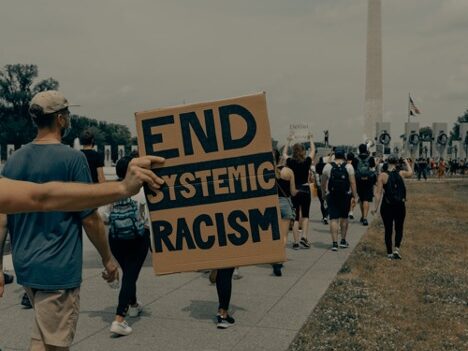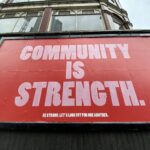We will soon reach the 2nd anniversary of the heinous murder of George Floyd. This murder was so ugly and wrong that even white folks noticed – at least some of us did. Somehow, we had been able to overlook countless atrocious murders of Black and Brown and Native peoples for years, even generations. In last week’s post, Tim Leadem reminded us about the atrocious deaths at the Canadian Training Schools, operated by the Catholic Church.
As we approach the anniversary of Floyd’s murder, it strikes me as a good time to ask: What has changed since then? Are the streets safer for BIPOC people? Is the justice system fairer? Are economic opportunities more accessible? Is there any movement toward more economic equity?
These are not simple questions. The roots of racism are deep and complex and operate at the individual and system level. Hence, lasting change will require massive alterations at each level.
Often, I am overwhelmed by the enormity of this task and depressed by how long the struggle has been going on. I am stymied when I see the way that periods of progress are always followed by periods of regression.
Yet, I am buoyed by the fact that so many people are deeply committed to needed change. And I know that none of us is aware of more than a fraction of the efforts that are bearing fruit. While knowledge is not going to create change on its own, I believe that promising efforts deserve our collective attention.
Can you help? Over the next few weeks, I invite you to share your experience about what you are learning about racism and the work of advancing racial equity. You can share your experience in the comments, as a guest contributor, or by email to me at [email protected].
Like many of you, I have gathered with colleagues, friends, and family to explore our individual and collective racism and how we can take action. Last Sunday, I gathered with members of my wife’s and my extended families to talk about racism. We used several of these resources to deepen our discussion.
Videos and reading:
- Video: Interview with Ibram X Kendi, author of How to Be Anti-Racist (38 minutes)
- Article: “Putting in the Work to Be Anti-Racist” (NPR)
- Video (short 3:45 minutes) The Unequal Opportunity Race
As I ponder the question of what has changed since George Floyd’s death and what is mine to do, I find myself wondering what others have learned? What lessons can you share?
- Have you found a place to talk about race and racial change? What is the process or way that happens? What has worked or not worked for you?
- How do you pay attention to your own attitudes and behaviors about race?
- What are the key measures we should be tracking to determine personal and national progress in becoming a more racially equitable nation?
- What books, articles, videos and podcasts do you find most helpful in getting this conversation started with people who are open to the discussion? What about those with opposing views?
These are not easy questions and there are no simple answers. By sharing what we are learning, I am hopeful we will all be encouraged and guided in our work for a more perfect union.




Tom,
Thank you for sharing these important thoughts and for being such an exemplary model of how to stay actively engaged in issues related to social justice.
Thanks Anne, I appreciate your following Critical Conversations and adding your perspective. Best, Tom
I admire the courage and valor in being vulnerable to the topic. There is a venue at my local church that addresses these issues; I’m waiting for them to meet in person because I’m not comfortable discussing these topics via Zoom. I can be more authentic in person.
In the meantime, I have two suggestions that have helped along the way: Caste by Isabel Wilkerson and the podcast Codeswitching from NPR. Also, I continue to research the historical pioneers that provide insight for our troubled times.
Thx for challenging us to post!
Thanks Sally for your consistent engagement with Critical Conversations and your contributions. Thanls for the two resource suggestions – both very helpful.
Best, Tom